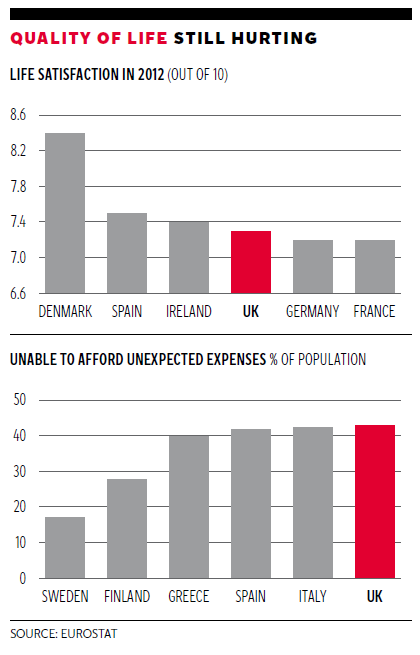Why would we want to leave a European club where many members are better off than we are?
The evidence contradicts Farage's claim that everything about the EU is bad


The quality of life in the UK is low compared to our European neighbours. The Office for National Statistics’ Measuring National Well-being Programme reported this week that, based on a survey of individuals, on a scale of one to 10, 77 per cent of adults in the UK rated their life satisfaction as a 7 or more in 2012/2013. This is unchanged from the year before, so the recovery hasn’t raised happiness at all. As Andrew Oswald and I first found some years ago, happiness is U-shaped in age, with the lowest levels of happiness in the 45 to 54 age group (7.1/10) and the highest in the 16 to 19 and 65 to 79 age groups (both 7.8/10). It certainly does seem that there is a mid-life crisis.
The exact same result, that well-being is U-shaped in age, is found in this data, whether people are asked about life satisfaction, happiness, stress or whether life is meaningful. So it doesn’t seem to matter at all what question is asked: the results are essentially the same. We also find that happiness is higher among women, higher among married people than single people, higher among the employed than the unemployed, higher among the religious and right-wingers – but that is for another day.
This week the European Commission also published data on a whole variety of measures of well-being that allow us to put these results in context. They also reported equivalent results on life satisfaction by country, also on a scale from one to 10, from a survey conducted across all 28 EU countries in 2011. The results, reported in the first chart, show the UK average at 7.3 (there is often variation in estimates across surveys) and the UK ranks 10th, with the remaining countries not included on the chart all ranked lower.
There has been considerable interest in recent years, especially following the Stiglitz-Sen-Sarkozy Commission, in trying to find broader measures of a country’s well-being than GDP. A multi-dimensional measure of well-being is feasible, but the problem is what items do you include in the index and what weight do you give to each indicator? Should they all have equal weights or should some have higher weights than others? Economics doesn’t help us much here.
In addition to the life satisfaction measure the Commission also reported 10 other measures that could be used to measure quality of life. Notably, they didn’t produce a single aggregate measure. It is appropriate to examine each in turn and for simplicity I draw comparisons with France, which on most measures ranks higher than the UK even though it normally ranks lower on life satisfaction. Out of the 11 measures, the UK ranks above France in only four . And the UK doesn’t do well on any of these 11 measures. In not a single case does it rank among Europe’s top five countries. Levels of well-being under the Coalition are extremely low in comparison with our European neighbours. The quality of life is well below Denmark, Sweden, Austria, the Netherlands, Luxembourg, Germany, France and in several instances even Spain, Italy and Ireland. For example, somewhat surprisingly, life expectancy is markedly higher in Spain and Italy than it is in the UK.

Here are the other 10 measures, with France’s ranking in brackets:
GDP/capita; the UK ranks 11th (10th) with Luxembourg the highest and Bulgaria the lowest.
Median income: the UK ranks 11th (7th) with Luxembourg the highest and Romania the lowest.
Inequality; the UK ranks 20th (14th) with Spain the highest and Slovenia the lowest.
Long-term unemployment, defined as the share of those who have been unemployed for 12 months and more in the workforce; the UK ranks 8th lowest (14th) with Spain the worst and Austria the lowest.
Life expectancy: UK ranks 10th at 81 (3rd at 82.1) with Spain the best (82.5) followed closely by Italy (82.4) with Lithuania the lowest (74.1).
Early school leavers, defined as youngsters aged 18 to 24 who have finished no more than a lower secondary education and are not involved in further education or training. The UK ranks badly at 23rd (20th).
Unable to afford unexpected expenses: defined as those persons unable to face unexpected financial expenses as a share of the total population. The UK ranks 17th (9th).
Homicide rates; UK ranks 14th (6th) with Slovenia lowest and Lithuania highest (74.1).
Gender pay gap: defined as the difference between average gross hourly earnings of male paid employees and of female paid employees as a percentage of average gross hourly earnings of male paid employees. Here the UK does poorly with a rank of 20th (12th).
Pollution: UK ranks 10th (12th) with Finland lowest and Bulgaria highest.
Obviously this is not a definitive list and there are other obvious candidates for inclusion such as the unemployment rate itself, where the UK ranks much better than France, but it’s a good start. Yet what stands out most, in a week where Nigel Farage apparently won a live debate among the voters with Nick Clegg, is that there is evidence that contradicts the Ukip leader’s claim that everything about the EU is bad.
It appears the UK is currently a member of an EU club where at least 10 members have a markedly higher quality of life. Their people are richer, happier, live longer, are in less unequal societies, with smaller percentages unable to afford unexpected expenses, with fewer murders and less pollution. Sounds like a club most people would want to join, Nigel. If not, why not?

Join our commenting forum
Join thought-provoking conversations, follow other Independent readers and see their replies